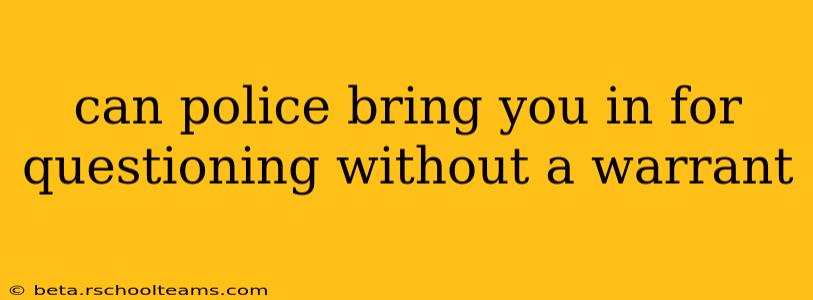The question of whether police can bring you in for questioning without a warrant is complex and depends heavily on the circumstances. The short answer is: sometimes, but with significant limitations. Your rights are protected by law, and understanding these protections is crucial.
While police generally cannot arrest you without probable cause, the concept of "detention" is different. They can briefly detain you for questioning, but this detention must be reasonable and justified. Let's delve into the specifics.
What Constitutes a "Reasonable" Detention?
A reasonable detention allows police to briefly hold you for questioning under specific circumstances. This is often referred to as a "Terry Stop," named after the landmark Supreme Court case Terry v. Ohio. For a detention to be considered reasonable, the police must have:
-
Reasonable suspicion: This is a lower standard than "probable cause" needed for an arrest. Reasonable suspicion means the police have specific, articulable facts that lead them to believe a crime has been, is being, or is about to be committed, and that you are involved. This suspicion must be based on more than a hunch or gut feeling. Examples might include witnessing suspicious behavior, matching a description from a witness, or being in a high-crime area.
-
A brief duration: The detention must be brief. The police cannot hold you indefinitely. The length of a reasonable detention will depend on the circumstances but should be limited to the time necessary to investigate the reasonable suspicion.
-
Scope limited to the suspicion: The scope of the search and questioning must be limited to what is relevant to the reasonable suspicion. Police cannot expand the scope of the detention beyond what's necessary to address the initial suspicion.
What Happens if the Police Go Too Far?
If police exceed the boundaries of a reasonable detention – for example, detaining you for an unreasonably long period or expanding the scope of the questioning beyond the initial suspicion – the detention becomes unlawful. Any evidence obtained during an illegal detention can be suppressed in court, meaning it cannot be used against you.
Can Police Bring You to the Station for Questioning Without a Warrant?
Generally, no. While a brief detention at the scene is permissible with reasonable suspicion, taking you to the police station for questioning without a warrant is typically considered an arrest, requiring probable cause. This is because being taken to the station significantly restricts your freedom of movement. However, there are exceptions, such as if you voluntarily agree to go to the station.
What if I'm a Suspect in a Serious Crime?
Even in serious crime investigations, police need probable cause to arrest you. While they might initially detain you with reasonable suspicion, that suspicion needs to escalate to probable cause before an arrest can be made and you can be taken to the station for prolonged questioning.
What Are My Rights During a Police Detention?
You have several crucial rights during a police detention:
-
The right to remain silent: You are not obligated to answer any questions. It's always advisable to politely but firmly invoke your right to remain silent and request an attorney.
-
The right to an attorney: You have the right to have an attorney present during questioning. If you cannot afford an attorney, one will be appointed to you.
-
The right to refuse a search: Unless they have a warrant or probable cause for a search, you can refuse to allow them to search your person, vehicle, or belongings.
What Should I Do If Police Detain Me?
If police detain you, remain calm and polite. Remember your rights: remain silent, request an attorney, and do not consent to searches without a warrant or probable cause. If you feel the detention is unlawful, document everything you can remember – the time, location, officers' names, and what happened – and seek legal counsel as soon as possible.
This information is for general knowledge and should not be considered legal advice. If you have specific questions or concerns regarding your rights, consult with a qualified legal professional.
